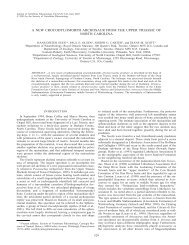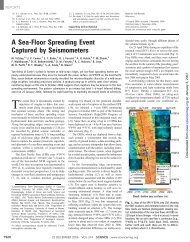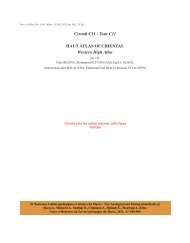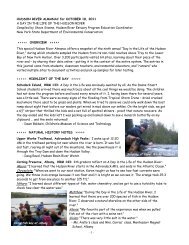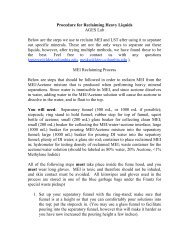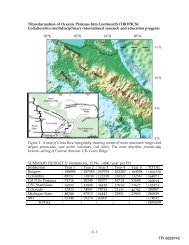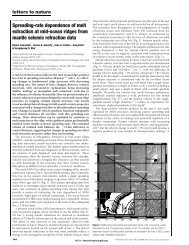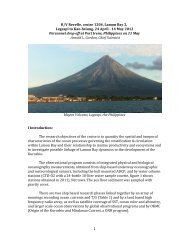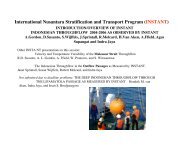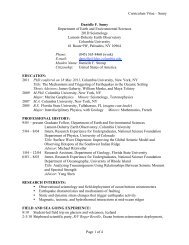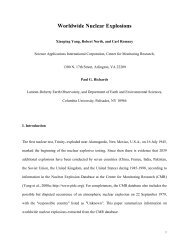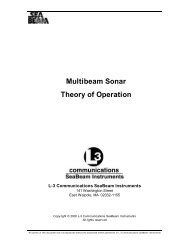Transport: Non-diffusive, flux conservative initial value problems and ...
Transport: Non-diffusive, flux conservative initial value problems and ...
Transport: Non-diffusive, flux conservative initial value problems and ...
Create successful ePaper yourself
Turn your PDF publications into a flip-book with our unique Google optimized e-Paper software.
76<br />
real function cinterp1d(ar,wt,in,ni)<br />
implicit none<br />
integer ni<br />
real ar(ni)<br />
real wt(4)<br />
integer in(4)<br />
cinterp1d=(wt(1)*ar(in(1))+wt(2)*ar(in(2))+ ! cubic interpolation<br />
& wt(3)*ar(in(3))+wt(4)*ar(in(4)))<br />
return<br />
end<br />
For more interesting <strong>problems</strong> where the velocities change with time, you will<br />
need to recalculate the weights every time step. This can be costly but the overall<br />
accuracy <strong>and</strong> lack of courant condition still makes this my favourite scheme. Here’s<br />
another version of the code which uses function calls to find the weights <strong>and</strong> do the<br />
interpolation 2 .<br />
c***********************************************************************<br />
c upsemlag2: 1-D semi-lagrangian updating scheme for updating an<br />
c array without a source term. Uses cubic interpolation for the<br />
c <strong>initial</strong> <strong>value</strong> at time -\Delta t.<br />
c<br />
c Version 2 assumes velocities are known but changing with time <strong>and</strong><br />
c uses function calls for finding weights <strong>and</strong> interpolating. A good<br />
c compiler should inline these calls in the loop<br />
c<br />
c Variables:<br />
c arn(ni): real array of old <strong>value</strong>s (n)<br />
c arp(ni): real array for new <strong>value</strong>s (n+1)<br />
c vn(ni): velocities at time n<br />
c vp(ni): velocities at time n+1<br />
c wk(ni): array to hold the average velocity .5*(vn+vp)<br />
c ni: full array dimensions<br />
c dx: horizontal grid spacing<br />
c dt: time step<br />
c is,ie: bounds of domain for updating<br />
c it: number of iterations to find interpolating point<br />
c***********************************************************************<br />
subroutine upsemlag2(arn,arp,vn,vp,wk,ni,is,ie,dx,dt,it)<br />
implicit none<br />
integer ni,i,is,ie<br />
real arp(ni),arn(ni)<br />
real vp(ni),vn(ni)<br />
real wk(ni)<br />
real dx,dt<br />
integer it<br />
real hdt,hdtdx<br />
real wt(4),in(4) ! weights <strong>and</strong> indices for interpolation<br />
real cinterp1d<br />
external cinterp1d<br />
hdt=.5*dt<br />
hdtdx=hdt/dx<br />
call arrav3(wk,vn,vp,ni) ! get velocity at mid level<br />
do i=is,ie<br />
call getweights1d01(wk,wt,in,ni,i,hdtdx,it)<br />
arp(i)=cinterp1d(arn,wt,in,ni)<br />
enddo<br />
2 note: a good compiler will inline the subroutine calls for you if you include the subroutines in<br />
the file. On Suns running Solaris an appropriate option would be FFLAGS=-fast -O4, look at<br />
the man pages for more options





